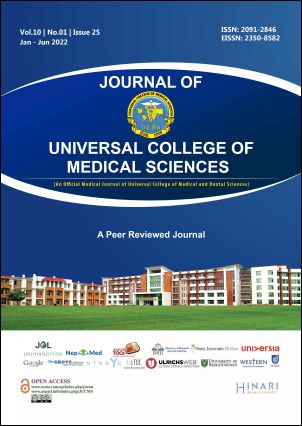Efficacy and Safety of Dipeptidyl Peptidase-4 Inhibitor Compared to Sulphonylurea in Type II Diabetes Patients Inadequately Controlled with Metformin Alone
DOI:
https://doi.org/10.3126/jucms.v10i01.47228Keywords:
Dipeptidyl peptidase-4 inhibitor, Efficiacy, Metformin, Type 2 DMAbstract
INTRODUCTION
Diabetes is a metabolic disorder marked by high blood glucose levels, and treatment often requires multiple drugs to achieve adequate glycemic control. In individuals with type 2 diabetes mellitus who do not respond to Metformin, doctors may prescribe a Dipeptidyl Peptidase-4 inhibitor or a Sulphonylurea as potential add-on therapy. The study was conducted to compare the efficacy and safety of the Dipeptidyl Peptidase-4 inhibitor with Sulphonylurea.
MATERIAL AND METHODS
This was an interventional, comparative study involving 100 type 2 diabetic patients who visited the Medicine department at Universal college of Medical Sciences. All the eligible patients were randomly divided into two treatment groups (50 each): Group A (Sulphonylurea + Metformin) and Group B (Dipeptidyl Peptidase-4 inhibitor + Metformin). Treatment was provided for 18 weeks, and patients were investigated for blood glucose parameters like glycosylated hemoglobin, fasting blood glucose, postprandial glucose at baseline and after 18 weeks of follow-up, and questions regarding adverse reactions. The efficacy of the drugs between the two treatment groups was compared using an independent t-test.
RESULTS
Dipeptidyl Peptidase-4 inhibitor plus Metformin was found to be superior to Sulphonylurea plus Metformin in terms of HbA1c-lowering efficacy (p=0.030). A total of 26% of patients in the Sulphonylurea group reported unpleasant hypoglycemic events, compared to 6% in the Dipeptidyl Peptidase-4 inhibitor group (p=0.006). Patients treated with Sulphonylurea gained weight over 18 weeks, but those on Dipeptidyl Peptidase-4 inhibitor lost weight (p=0.043).
CONCLUSION
Compared to Sulphonylurea, adding a Dipeptidyl Peptidase-4 inhibitor to a Metformin therapy significantly improves glycaemic control in type 2 diabetic patients who are not well controlled with Metformin monotherapy, without producing hypoglycemia or weight gain.
Downloads
Downloads
Published
How to Cite
Issue
Section
License
Copyright (c) 2022 Journal of Universal College of Medical Sciences

This work is licensed under a Creative Commons Attribution-NonCommercial 4.0 International License.
Authors have to give the following undertakings along with their article:
- I/we declare that this article is original and has not been submitted to another journal for publication.
- I/we declare that I/we surrender all the rights to the editor of the journal and if published will be the property of the journal and we will not publish it anywhere else, in full or part, without the permission of the Chief Editor.
- Institutional ethical and research committee clearance certificate from the institution where work/research was done, is required to be submitted.
- Articles in the Journal are Open Access articles published under the Creative Commons CC BY-NC License (https://creativecommons.org/licenses/by-nc/4.0/)
- This license permits use, distribution and reproduction in any medium, provided the original work is properly cited, and it is not used for commercial purposes.




